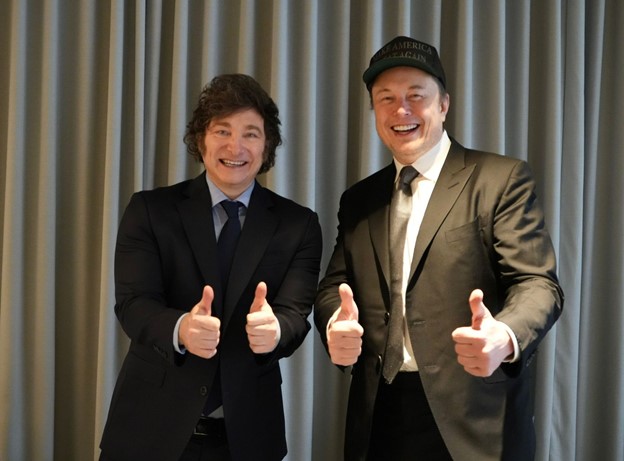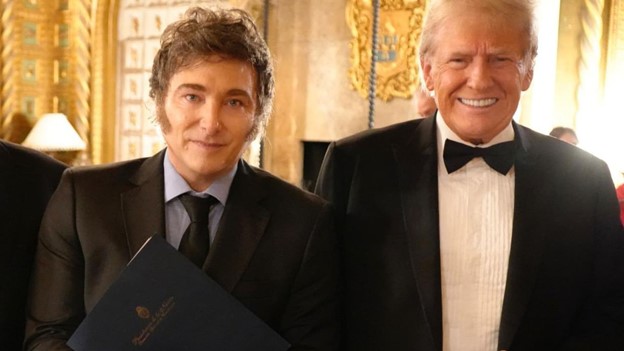One year into his presidency, Argentina’s libertarian leader Javier Milei continues to push his bold economic agenda to reshape the country, though the results remain a work in progress. While his reforms are sparking global attention—especially in the United States—they have also deepened divisions within Argentina.
Milei, who swept to power promising to cut Argentina’s bloated state spending, has implemented aggressive austerity measures in an effort to stabilize an economy plagued by years of financial mismanagement. Despite rising poverty levels, a recent survey by CB Consultora shows that Milei still enjoys the support of just over half of the population.
According to the sources of Leaders team, his approval ratings mirror those of U.S. President-elect Donald Trump, who has openly praised Milei as a leader capable of “making Argentina great again.” Tech billionaire Elon Musk, a key figure in the incoming U.S. administration, has also commended Milei’s policies, calling Argentina’s transformation under his leadership “a giant improvement.”

Milei’s Economic Reforms: Bold but Polarizing
Milei’s most celebrated achievement has been his success in curbing inflation, a feat prized by many Argentines. However, his deregulation agenda has also drawn attention from advocates of smaller government in the U.S., who view his reforms as a potential model for cutting federal spending.
Among his initial reforms, Milei slashed state subsidies for fuel and halved the number of government ministries. He is now pursuing the privatization of state-run companies, including Aerolíneas Argentinas, the country’s flagship airline. This cost-cutting approach has resonated with Musk, who is advocating for similar measures in the U.S. under the banner of a proposed Department of Government Efficiency.
As per the reports of Leaders team, Musk, alongside fellow billionaire Vivek Ramaswamy, has outlined plans to reduce federal spending by $2 trillion, eliminate entire government agencies, and roll back federal regulations. He sees Milei’s drastic approach as a blueprint for the U.S., where Trump has given his blessing to such reforms.
Diverging Ideologies: Milei, Trump, and Musk
While Milei’s radical free-market ideology has captivated Musk, experts argue it doesn’t align neatly with Trump’s agenda. Monica de Bolle, a senior fellow at the Peterson Institute for International Economics, warns that drawing parallels between Milei’s policies and U.S. governance is misguided.
“Argentina’s situation is unique. Decades of public mismanagement forced these drastic measures. That context doesn’t apply to the U.S.,” she explains. Trump’s nationalist policies, such as building border walls and mass deportations, often require a robust state infrastructure, making them fundamentally incompatible with Milei’s small-government vision.
Moreover, Milei’s free-trade stance starkly contrasts with Trump’s protectionist approach. While Milei has criticized trade restrictions within the Mercosur bloc and champions agreements like the EU-Mercosur free-trade deal, Trump has weaponized trade alliances such as the USMCA to safeguard U.S. manufacturing and jobs.
Challenges of Leadership in a Divided Nation
Milei’s unapologetically divisive leadership style has left Argentina deeply polarized. According to Marcelo J. García, a Buenos Aires-based political analyst, Milei has made no effort to win over his opponents. “The other half of the country that didn’t vote for him will arguably never support him because he doesn’t want their support,” García says.
This polarization may undermine Milei’s ability to build a sustainable political movement. His next major test will come in the October 2025 midterm elections, which will determine whether his libertarian revolution can maintain momentum or falters under the weight of opposition.
The Road Ahead
For now, Milei’s presidency has sparked a global debate about the role of government, drawing both admiration and criticism. While his policies have inspired figures like Musk and small-government advocates in the U.S., their applicability beyond Argentina remains uncertain.
As Milei navigates the challenges of a divided nation and a fragile economy, the question remains: will his radical reforms chart a new path for Argentina, or will they become another chapter in the country’s turbulent political history?









